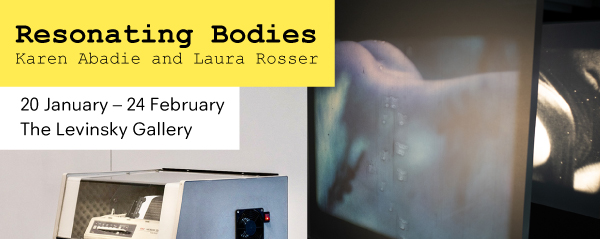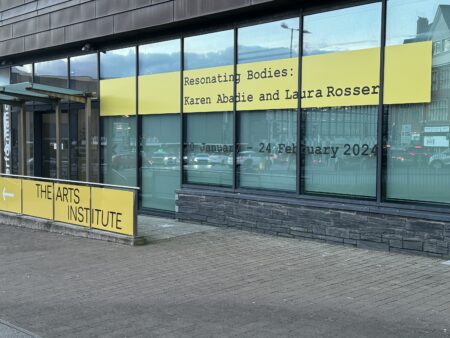Resonating Bodies exhibition opens
January 20, 2024

A joint exhibition and accompanying schedule of events with Dr Karen Abadie and Dr Laura Rosser at the Arts Institute Gallery, The University of Plymouth.
Resonating Bodies explores the complexities of relationships between humans and machines. The exhibition responds to the fragility and uncertainty that we face in our increasingly digital and automated world. At a time when our sense of being is in a state of flux, the artists, Karen Abadie and Laura Rosser, lean into this unknown through the materiality of the machine. The interplay of human and nonhuman machine bodies are messy and challenged through the corporeality of the work. The machines resonate, clatter and converse in the space, through an entangling of analogue and low-fi technologies, celluloid, paper and ink. Each artist embraces the errors, slip-ups, scratches and ruptures that emerge through working with old, often broken, or malfunctioning technologies. The collective artworks posed questions around political, cultural and societal breaking down, which instead might be seen as a means to repair, renew, regenerate and refresh. The artists’ interdisciplinary practices challenge misconceptions of analogue machines as ‘obsolete’ or ‘outdated’ and reimagine human and nonhuman relationships in these precarious times.
Abadie’s practice explores what it is to be an embodied being in collaboration with the machine. The imagery presents apparently opposing embodied states that float and bounce around the exhibition space. The artwork offers a repositioning of these states with leaky messy boundaries as these materialities interweave, converse, entangle and collide. The celluloid film interacts with the heavy mass of the analogue machines, its tender surface becoming worn, scarred, scratched and even broken. The collision between human and nonhuman undeniably articulated by this apparent violence.
Rosser’s practice draws on expanded understandings of error to reimagine our relationships with machines, systems and online spaces. Working with her collection of dot matrix printers and printed ephemera, she creates live text-based installations that embrace liveliness as potential for unforeseen creativity, signalling a move away from conventions of logic and order. This work creates opportunity for diverse voices and new relations to emerge. Her playful use of language and translation disrupt – and interrupt – rational thought and digital structures; preferring the misadventurous and crooked path.
https://www.plymouth.ac.uk/students-and-family/arts-institute-public-programme

